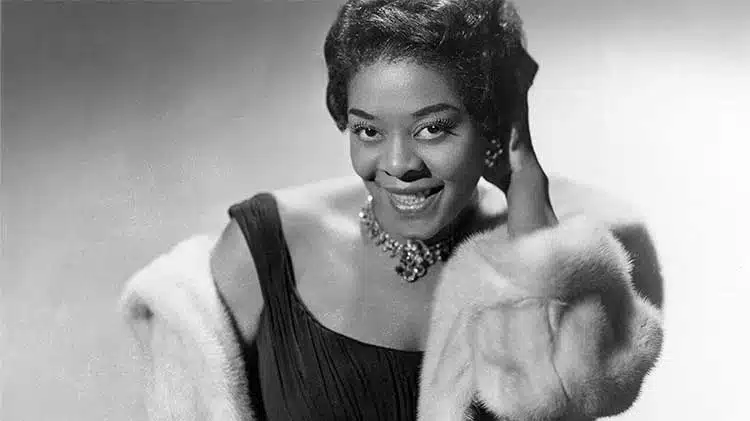Dinah Washington | Barbiturate Overdose Death
- How Did Dinah Washington Die?
- About Dinah Washington
- Music Career
- History of Substance Abuse
- Did She Attend Addiction Treatment?
- Recovery Is Possible

American jazz singer and pianist Dinah Washington was well-known for her amazing voice and unique delivery. She was often called the “Queen of the Blues” but also sang pop, rhythm and blues, and gospel throughout her career.
Unfortunately, her career was cut short when she died of an unintentional drug overdose at the age of 39.
How Did Dinah Washington Die?
Dinah Washington died on December 14, 1963, in Detroit, Michigan of an accidental overdose at the age of 39. An autopsy showed she overdosed on secobarbital and amobarbital, and both were prescription barbiturates for diet and insomnia.
Her husband at the time, Dick Lane, went to bed with her and woke up to find her slumped over and unresponsive. Once emergency help arrived, she was pronounced dead on the scene.
She is buried in Burr Oak Cemetery in Alsip, Illinois.
About Dinah Washington
Dinah Washington was born Ruth Lee Jones on August 29, 1924, in Tuscaloosa, Alabama. Her mother, Azalea Williams, was a singer and pianist, and her father Ollie Jones, was a laborer.
As a child, her family moved to Chicago to escape increasing activity from the Ku Klux Klan. In Chicago, she sang and played the piano in the church choir.
In her teens, she became a member of the Sallie Martin Gospel Singers and dropped out of high school. At 15, she won a talent contest at Chicago’s Regal Theater and started singing and playing piano in numerous Chicago nightclubs.
It wasn’t until 1942-43 that she started going by the stage name Dinah Washington. It was during this time that she began singing with the Lionel Hampton band and then in 1946, she began her solo career with Mercury Records.
Music Career
From 1949 through 1955, almost 30 of Washington’s songs hit the top 10 on the R&B charts. She is most well-known for songs like:
- “Evil Gal Blues”
- “Am I Asking Too Much”
- “Unforgettable”
- “Baby Get Lost”
- “Trouble in Mind”
- “What A Diff’rence a Day Makes” (arguably her most famous)
In 1954 and 1955, she recorded two albums: Dinah James and Dinah Washington: For Those In Love, which was arranged by Quincy Jones.
In 1959, she went from R&B to pop with “What a Difference a Day Makes,” and won a Grammy Award for best R&B record.
During the 1950s and 60s, she also performed at many different jazz festivals including Newport Jazz Festival and the International Jazz Festival.
Personal Life
Washington’s personal life was just as interesting as her music.
She married her first of 8 husbands, John Young, in 1942 when she was only 17—she divorced him three months later.
She met her second husband, George Jenkins, in 1944. They married and had a child in 1946, but divorced that same year. In 1947, she married her third husband, Robert Grayson, and they stayed together for two years and had a son.
In 1963, she married her eighth and final husband, Detroit Lions player Dick Lane. She would die the same year she married him.
Some of her biggest musical influences were Billie Holiday and Bessie Smith.
Posthumous Accolades
In 1986, Washington was posthumously inducted into the Alabama Jazz Hall of Fame and the Rock and Roll Hall of Fame in 1993.
Three of her recordings have also been inducted into the Grammy Hall of Fame including “What a Difference a Day Makes,” “Teach Me Tonight,” and “Unforgettable.”
In 1987, Queen of the Blues: A Biography of Dinah Washington came out by James Haskins. Another book, Queen: The Life and Music of Dinah Washington by Nadine Cohodas, was released in 2007.
Dinah Washington’s History of Substance Abuse
Washington’s issues with substance abuse occurred midway through her career. She tried a number of prescription drugs and also had a problem with alcohol. It was the combination of drugs and alcohol that led to her death.
Washington had issues with her weight and took prescription diet pills to deal with it. On the night she died, she took those diet pills along with sleeping pills and alcohol, and the combination proved to be fatal.
Did Dinah Washington Attend Addiction Treatment?
It’s unknown whether Dinah Washington received any treatment for drug or alcohol abuse. If she didn’t receive any treatment, it could be because she didn’t seek it out or because it wasn’t as available as it is today.
Recovery Is Possible
Barbiturates and other sedative-hypnotics are powerful drugs, and the death of Dinah Washington highlights the dangers of these substances.
If you or a loved one struggle with prescription drug or alcohol use, know that recovery is possible. To learn how we treat alcohol or drug addiction with a combination of evidence-based services, peer support, and aftercare resources, please contact us today.
Written by Ark Behavioral Health Editorial Team
©2024 Ark National Holdings, LLC. | All Rights Reserved.
This page does not provide medical advice.
Britannica - Dinah Washington
Encyclopedia of Alabama - Dinah Washington
The Independent - A shame about the girl: When she died in 1963, Dinah Washington was the self-appointed 'queen of the blues'. Anthony Denselow thinks her time has come again
NPR - Dinah Washington: A Queen in Turmoil

Questions About Treatment?
Ark Behavioral Health offers 100% confidential substance abuse assessment and treatment placement tailored to your individual needs. Achieve long-term recovery.
100% confidential. We respect your privacy.
Prefer Texting?
Our friendly support team is here to chat 24/7. Opt out any time.







 Learn More
Learn More








